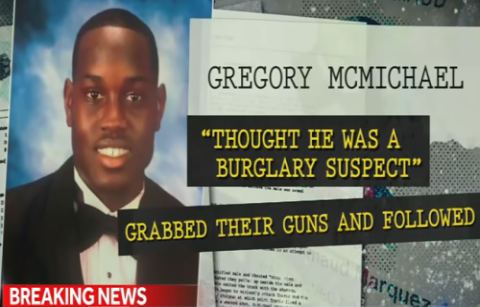[Ahmaud Arbery\Donald Trump]
Hutchinson: “His [Trump’s] exact words were there is an “empty spot “on the video of the deadly encounter. This was a not so subtle hint that Arbery may not be the totally innocent, blameless victim of his killers, Gregory and Travis McMichaels.”
Photo: YouTube
Is Trump’s “empty spot” statement meant to signal that the murder of Ahmaud Arbery maybe justified?
Trump once more proved the hard-political truism that when Presidents speak out on a heinous racial killing or violence, their words have weighty consequences.
That happened when Trump digressed from his unusual ramble at his press conferences to drop a big hint that there may be more than meets the eye in the murder of Ahmaud Arbery.
His exact words were there is an “empty spot “on the video of the deadly encounter. This was a not so subtle hint that Arbery may not be the totally innocent, blameless victim of his killers, Gregory and Travis McMichaels that the world saw in the shocking video. Trump’s statement and inference could as it was intended influence the course of the case.
This is not new in racial violence cases. The sordid history of racially charged murders or violence has shown that when Presidents speak out on a case, things happen. In my book, Betrayed: A History of Presidential Failure to Protect Black Lives, I detail the impact Presidents have when they speak out on racial violence. President Truman expressed outrage at the gouging out by a white South Carolina cop in 1946 of African-American returning World War 2 veteran Isaac Woodard’s eyes. This stirred an immediate Justice Department investigation.
President Eisenhower’s outrage at the attacks on parents and school children in Little Rock, Arkansas in 1957 and John F. Kennedys public outrage at the attacks on freedom riders in Alabama prompted federal intervention. President Johnson’s multiple statements on racial attacks in 1964 and 1965 in Mississippi, Alabama and Georgia prompted federal prosecutions of the attackers. President Jimmy Carter’s outrage at the beating death by Miami police officers of Arthur Lee McDuffie in 1979 assured indictments and prosecutions of the cops. President George Bush Sr. expressed his “disgust” and “anger” at the videotaped beating by LAPD officers of Rodney King in 1991. This assured a federal prosecution of the officers. Obama’s statements on the slaying of Michael Brown in Ferguson, Missouri in 2014 prompted a Justice Department investigation and a series of initiatives from the Department on police reform measures.
Now we come back to Trump. Like most who saw the sickening video murder of Arbery, Trump initially expressed revulsion at the killing. It would be hard not to. But Trump being Trump could not let it go at that. This is clearly a case that has more than just strong racial overtones to it. The accused killers are veteran former white cops in a part of Georgia that trends heavily GOP and is strongly Trump supportive. The McMichaels fit the near textbook profile of strong Trump supporters-less educated, white, male, law enforcement, conservative, and Southern. Georgia once rock-solid red is fast becoming a state that could well be in play for the Democrats in November. So, it’s not just race that hangs heavy in the air in the Arbery murder, but politics.
Trump certainly understood that in the shocking racial rampage by white supremacists/nationalists in 2017 in Charlottesville, in Virginia. He branded some of them “fine people.” He slightly walked his inflammatory characterization back after the firestorm of protest. But the “fine people” label deftly sent a clear signal that when it comes to stoking racial hate and fomenting racial violence, there’s no difference between a white nationalist true believer and those who stand against what they stand for. Trump was just following a well-worn template that the GOP has used for ages when it comes to a racist crack, dig, slur, or in this case a racist ― and very violent ― march by white racists.
The ploy goes like this: Issue a pious, indignant statement denouncing the racist quip or act while at the same time being careful not to make any connection between the racist actions and the GOP. The added element in the Arbery murder is that there’s another script in such cases that Trump can borrow from. That is demonizing the unarmed young Black male victim of a cop killing. This is done by digging up every scratch of dirt on the victim– an arrest, a criminal charge, drug use, or family dysfunctionality. Then plaster that in the headlines to smear the victim. This feeds the well-worn stereotyped of the crime and violence prone young Black male. This does much to color, jade and taint the case. The seed is firmly planted in the public mind that maybe the victim was not Simon pure and totally blameless.
Trump is no fool. He knows the Arbery case is a political minefield with a big swatch of his backers cheering on the McMichaels.
Like past Presidents who have spoken out on racial violence and gotten action, Trump presumably wants it here too. Trump’s words on Arbery assure that will happen in the case. But if his words plant any doubt about Arbery being the victim, it’s the wrong kind of action.
Earl Ofari Hutchinson is an author and political analyst. He is the author of COVID POLITICS—Trump’s Deadly Game (Amazon) He is an associate editor of New America Media. He is a weekly co-host of the Al Sharpton Show on Radio One. He is the host of the weekly Hutchinson Report on KPFK 90.7 FM Los Angeles and the Pacifica Network





